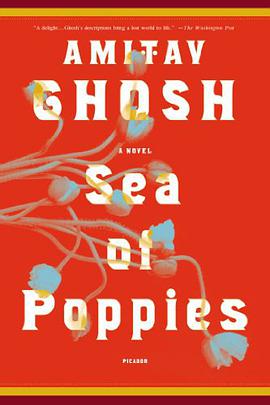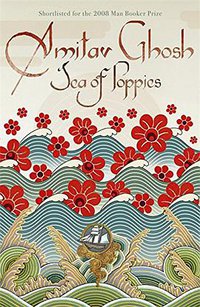Sea of Poppies
Douban
A Novel
Amitav Ghosh
overview
The first in an epic trilogy, "Sea of Poppies" is "a remarkably rich saga . . . which has plenty of action and adventure a la Dumas, but moments also of Tolstoyan penetration--and a drop or two of Dickensian sentiment" ("The Observer " London]). At the heart of this vibrant saga is a vast ship, the "Ibis." Her destiny is a tumultuous voyage across the Indian Ocean shortly before the outbreak of the Opium Wars in China. In a time of colonial upheaval, fate has thrown together a diverse cast of Indians and Westerners on board, from a bankrupt raja to a widowed tribeswoman, from a mulatto American freedman to a free-spirited French orphan. As their old family ties are washed away, they, like their historical counterparts, come to view themselves as "jahaj-bhais," or ship-brothers. The vast sweep of this historical adventure spans the lush poppy fields of the Ganges, the rolling high seas, and the exotic backstreets of Canton. With a panorama of characters whose diaspora encapsulates the vexed colonial history of the East itself, "Sea"" of Poppies"" "is "a storm-tossed adventure worthy of Sir Walter Scott" ("Vogue""). " Amitav Ghosh is the internationally bestselling author of many works of fiction and nonfiction, including "The Glass Palace," and is the recipient of numerous awards and prizes. Ghosh divides his time between Kolkata and Goa, India, and Brooklyn, New York. Shortlisted for the Man Booker PrizeLonglisted for the International IMPAC Literary AwardAn "Economist" Best Book of the Year A "San Francisco Chronicle" Best Book of the YearA "Christian Science Monitor" Best Book of the YearA "Publishers Weekly" Best Book of the Year At the heart of this vibrant story is a vast ship, the "Ibis." Its destiny is a tumultuous voyage across the Indian Ocean to fight China's vicious nineteenth-century Opium Wars. The crew is a motley array of sailors and stowaways, coolies and convicts. In a time of colonial upheaval, fate has thrown together a diverse cast of Indians and Westerners, from a bankrupt raja to a widowed tribeswoman, from a mulatto American freedman to a freespirited French orphan. As their old family ties are washed away, they, like their historical counterparts, come to view themselves as "jahaj-bhais," or ship-brothers. An unlikely dynasty is born, which will span continents, races, and generations. This historical adventure spans the lush poppy fields of the Ganges, the rolling high seas, the exotic backstreets of Canton. But it is the panorama of characters, whose diaspora encapsulates the vexed colonial history of the East itself, that makes "Sea of Poppies "so vibrant. "Ghosh's best and most ambitious work yet is an adventure story set in nineteenth-century Calcutta against the backdrop of the Opium Wars. On the "Ibis," a ship engaged in transporting opium across the Bay of Bengal, varied life stories converge. A fallen raja, a half-Chinese convict, a plucky American sailor, a widowed opium farmer, a transgendered religious visionary are all united by the 'smoky paradise' of the opium seed. Ghosh writes with impeccable control, and with a vivid and sometimes surprising imagination: a woman's tooth protrudes 'like a tilted gravestone'; an opium addict's writhing spasms are akin to 'looking at a pack of rats squirming in a sack'; the body of a young man is 'a smoking crater that had just risen from the ocean and was still waiting to be explored.'"--"The New Yorker" "In 1883, the British government sent the accomplished linguist Sir George Griers-on to look into alleged abuses in the recruitment of indentured servants from India (known as 'coolies') who ended up on ships bound for British plantations throughout the world. In his diary, Grierson wrote about an encounter with the father of one female coolie in a village along the Ganges, noting that the man 'denied having any such relative, and probably she had gone wrong and been disowned by him.' The historical record provides only a trace of this woman: a name, a processing number, a year of emigration. In his ambitious new novel, "Sea"" of Poppies," a finalist for this year's Man Booker Prize, Amitav Ghosh attempts to fill in the blanks left by the archives. Set partly in Bengal, the scene of Grierson's inquiry, and drawing on accounts the Englishman left, it opens in 1838 on the eve of the Opium Wars. A former slave ship called the Ibis has been refitted to transport coolies from Calcutta to the sugar estates of Mauritius, and for hundreds of pages we watch as its crew and passengers are slowly assembled until it finally gets on its way. The first in a projected trilogy, "Sea of Poppies" is big and baggy, a self-styled epic with colossal themes and almost a dozen major characters, including the son of an American slave (who is passing as white), the orphaned daughter of a French botanist (who is passing as a coolie) and an Anglophile raja (who has been wrongly sentenced to a penal colony on Mauritius). But a majority onboard are Indian peasants from the opium--producing countryside, forced by famine or scandal to seek a new life elsewhere. Devoted to reinvention, Ghosh's plot focuses on one of these villagers: Deeti, a widow who assumes another name and the (lower) caste of a new love as they escape to-gether on the Ibis."--Gaiutra Bahadur, "The New York Times Book Review ""Today it seems no year goes by without yet another Indian novel announcing its entry into the global canon, confirming Indian writing as among the most innovative and interesting anywhere.Over the last two decades, the Indian author Amitav Ghosh has established himself as a writer of uncommon talent who combines literary flair with a rare seriousness of purpose. His first novel, "The Circle of Reason," seemed very much in the Rushdie magical-realist tradition, but he has evolved considerably since then, notably in works like "The Shadow Lines" and more recently "The Glass Palace," which deal movingly and powerfully with the


